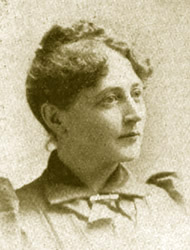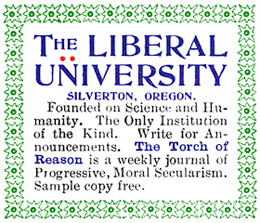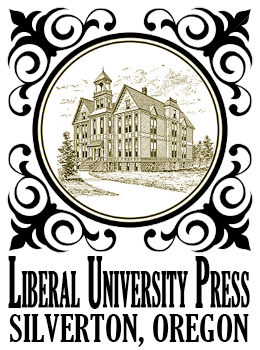By Marie Harrold Garrison — December, 1900
 Before me lies “A Defense of Agnosticism,” by our widely celebrated, deeply loved, most sincerely respected and truly revered worker for universal liberty of thought and expression, George Jacob Holyoake.
Before me lies “A Defense of Agnosticism,” by our widely celebrated, deeply loved, most sincerely respected and truly revered worker for universal liberty of thought and expression, George Jacob Holyoake.
The above-mentioned article is in part a reply to my “Weeds and Agnostics,” which appeared in the Free Thought Magazine for August. Mr. Holyoake’s “Defense of Agnostics” deals me some pretty sharp raps; still, like a dutiful and reverent worshiper in the Temple of Truth, I bear in mind who my critic is, and if there is any tone of disrespect or thoughtlessness in this reply, which for reasons hereinafter seen I entitle “Distinguished Dodgers,” I am unconscious of disrespect, my inner feeling being the opposite, since I never can forget that George Jacob Holyoake endured imprisonment even for my sake, not that he was conscious of my existence, but that the ills he endured were for the sake of everyone in the cause of Liberalism as against persecution.
But now let us directly to the topic in hand. As I again reread “Weeds and Agnostics,” and carefully, alongside of it, inspect Mr. Holyoake’s “Defense of Agnostics,” I see I have been guilty of causing misapprehension and have—seemingly—made a rather base insinuation. This apparent position of mine is largely due to the fact that my distinguished critic has detached from the body of my article paragraphs and ideas which when detached give a different shade of meaning than they do when considered with the whole. This is the case in one instance, especially, when my distinguished and earnest critic splits a paragraph, quoting the last half but omitting the first half.
After having pointed out what he calls strange statements, the gentleman further says: “There is a still more singular passage by the writer in question. She says: ‘I must assert that such men as Darwin and Huxley and Wallace and Spencer are not agnostics, though modesty caused Mr. Huxley to invent the name and apply it to himself.'”
At this point, mark you, Mr. Holyoake turns sharply on me anti declares that I made it appear that the above-mentioned great men all “lie.” Mr. Holyoake used the word lie, but nowhere in my whole article of “Weeds and Agnostics” does that word occur, and now, in defense of my own logic, I must insist on the entire paragraph being repeated. My words expressly are: “The name God being used to represent not only idealism in the mental and moral life of mankind but also the First Cause of all physical life, an essence still at work in the universe, I must insist that Darwin and Huxley and Wallace and Spencer and their ilk are not agnostic, though modesty caused Mr. Huxley to invent the name and apply it to himself.”
Now there the paragraph stands, in its entirety, and there let it stand. Its best defense is the very work of those men and their co-workers.
I declare if Mr. Holyoake has the assurance to dispute this point again, I’ll “convene the court” and call Ernest Haeckel, Thaddeus B. Wakeman and some others to the witness stand. where (as I see it) they must prove me “not guilty” as to logic, or they will prove themselves “liars,” to use Mr. Holyoake’s word. I raise my right hand and solemnly swear it is my honest conviction that these men arc not agnostic concerning the great combine, or Combine: Universe-Cause-God, and I further solemnly swear it is my honest conviction that of those three terms. “God” is the dependent, though (as above stated), “used to represent” the other two by a large portion of mankind (God or its equivalent in each language). Ah! there is another living witness of importance—Herbert Spencer. Mr. Spencer, please take the stand. Let’s have this thing settled now, once for all. However, while waiting for these scholars to make up their minds whether to appear in my behalf or not, I shall earnestly and, as some may say, barefacedly, continue submitting my own evidence and convictions.
It is perfectly clear to my mind that when Mr. Darwin and like scientists announced to a superstitionized world that the human race did not begin with a perfectly constructed pair of human beings in an exquisite garden of Eden, but at a time and place where no garden was possible they were proving themselves not agnostic. Our beloved Mr. Holyoake asserts in one instance that agnosticism is a neutral state, and again, “Agnosticism is judgment suspended.”
“By the same token,” as the Emerald Islanders say, those men were not agnostic who with one great motion swept aside the Bible account of creation and pronounced it as their judgment that animal life on earth did not begin with perfect specimens, either of brutes, birds or men, but began as a pulsing slime, a moving but (if I may be pardoned for inventing the word) uninstincted scum; particles evincing attraction and, repulsion; in other words, the now scientifically-historical primeval Amoeba, back to which is traced, link by link, through a long morphological chain, the origin of an expression of energy whose underlying forces were exceedingly simple and astonishingly far removed from any conditions that would necessarily imply the Big-Spirit-King-on-a-Throne idea, or, indeed, a Spirit-Being “hovering the face of the deep.”
It was the dogmatic demand of Holy Scripture that men should suspend their judgment, and I say those men, notably Mr. Darwin, in refusing to suspend judgment, actually did find out a phase of ultimate cause. Yes, directed human attention back millions of years, to what one may be pardoned for calling a feeble expression of energy of some heat-ray; either a luminous ray or otherwise, probably otherwise.
I regret that in my article I spelled first cause with capitals, and, indeed, regret that I made use of the word “first,” but instead simply “cause,” and underlying forces and energy.
I hold with those thinkers who claim there never was a beginning and never will be an end, but only periods of re-casting of atoms or re-correlations of “some things” seemingly precipitated through, from or by ether. I notice scientists sometimes spell ether with a capital, probably for the same reason that they spell Sun with a capital.
There is much hair-splitting concerning the all-absorbing topic, ether or Ether, but there is no reason why thinkers should not come to conclusions and announce them, even though they may afterwards prove erroneous.
The announced conclusions of one thinker may prove to be the point on which another thinker rests a “lever” and lifts a world.
Whether chemical elements can or cannot be transmuted into each other after they are seemingly formed remains, probably, a still open question. It will never do in this article to branch off onto such fine-point questions. What I want to insist on here is the fact that those workers who have plunged into what was once held as forbidden fields of inquiry and have brought to light new facts and thinkable ideas. theses, and announced the same instead of “holding judgment in a neutral state of suspense,” may be placed among find-outers (to use a term where “discoverers” would hardly express the meaning).
I do not hold such men agnostic. Come to think of it, I believe Mr. Darwin handled with discrimination the idea implied by agnosticism. The hull of the ship of Civilization is fairly warty with the Superstitious barnacles; the “tints far and no farther” barnacle; the “thus saith the Lord” barnacle, and how many more ruinous ones.
Mr. Darwin did the greatest work for the sanity of humanity that has ever been done. Though he directed his attention seemingly in one general line, he actually induced vital changes, modifications, reformation of methods in lines toward which he was seemingly not looking.
Look at the work he caused to be done by what may be called contagious inference and application. Humanitarianism was affected. The road of Robert Ingersoll was made less rugged, less thorny, because of what was called Darwinian Evolution. This is true, though Mr. Ingersoll did not for some years really apprehend the scope and inevitable outcome of the work of Mr. Darwin and his co-laborers.
Imagine what superstition would still be here had the first evolutionists refused to give the world their convictions. What if they had joined the despairing chorus of Prof. Du Bois Reymond and the school he led, the school that cried “It is no use to try; it is vain to think.”
But here comes another assertion by not only some religionists but some scientists, viz., “God and the world’ are one.” (Please interview Ernst Haeckel.)
I believe it and I infer that the much or little any one finds out concerning the world, the same much or little he or she finds out concerning “God,” and creative essence, and whoso finds out anything concerning a subject or object cannot say “Toward this I am agnostic.”
Mr. Holyoake says: “Among the uninformed and unthinking there is an impression that the term agnostic is used as a screen behind which lurks atheism afraid to show its face.” Since Mr. Holyoake in so many words called me “unthinking,” I take it that he charges me with believing that behind the term agnostic are lurking atheists afraid to show their faces.
This is too important a matter to be passed over, especially when coupled with the statement that I have virtually called agnostics liars. I am heartily glad Mr. Holyoake has thrown this shading on the subject, for we advance by being compelled to consider more than one aspect of a subject. By experience (not theorizing) I have come to have a high opinion of the people who are listed “atheists.” I have not found them to be “lurking” kind of people, neither cowardly people, and this brings me to a question that I think worth considering, viz.: “Is every man a coward who screens himself? Is every man a liar who does not utter his whole honest conviction? After years of experience can we find no other motive than fear of self-injury for the individual who hides or stands behind some screen?”
Experience goes farther than theorizing; and pursuant of experience permit me to state that I have sojourned in many parts of the world, and have come in contact with many people of varying temperaments and methods of thought. I have met not less than three marked thinkers and many less conspicuous ones, who have admitted that the older they grew the more fixed became their convictions that there could not in any logical probability exist anywhere that which religious people designate as a Supreme Being, yet these men confessed that the longer they lived the more inclined they were to keep their convictions to themselves because they had found by experience that the name atheist, like a false alarm of “fire,” had a tendency to produce a panic among people who had been thinking in restricted limits. Of the latter there are very many, yet they may have gone through college and may be looking inquiringly toward the field of science led by a semi-scientific religionist.
There is, at least, something noncombustible about science. The idea associated with scientific methods is that of slowness, deliberation. The truth of this was fully appreciated by the brainy people above alluded to, and those very men permit themselves, to-day, to be referred to as agnostics, yet I do not feel that I should be justified in applying to them the terms “hypocrite” and “liar,” because the said terms are so closely associated with intent to deceive for mean personal advantage, therefore I call such men dodgers, or, if you please, “Distinguished Dodgers.” The fact is, I have run across so many of these dodgers, who are moved by motives of kindness and discrimination, that I might truthfully apply to them the paradoxical words, “Honest Liars.”
The name “Atheist” came into vogue long ago, and was made bad use of during the periods when superstition was especially panicky and hysterically dogmatic. Today the terms “Ethical” and “Agnostic” are received with no pre-association of active enmity. In my opinion the position of the atheist includes the positions of the Ethical Culturist and Agnostic- the non-idolatrous, the humanitarian position.
In regard to Atheism comes a point in Mr. Holyoake’s “Defense of Agnostics” on which I must comment. My distinguished co-worker says that Atheism has no logical ground on which to stand. Now, as I look at it, any and all isms have logical ground on which to stand as isms which I take it signify the attitudes of people toward certain alleged facts or hypotheses.
Atheism does not imply either the ability or necessity of proving by exact science the non-existence of a Being-Deity as an All-Cause. Atheism simply describes the mental logical position of the individual minds who feel convinced within themselves (after reasoning on grounds of analogy and other grounds) that there is not a beginning, or, if there is, it is not to be described as a “God,” a “Deity.”
Mr. Holyoake complains of the dogmatism of the Atheist and of the Theist. Well, that is a common complaint, and I believe it is conceded that dogmatism is engaged in as a means of self-defense-a physical instinct. Mr. Holyoake says the Agnostic waits for proof. The word “proof,” however, is not as small as it looks, and I think I may wisely leave the suggested ground for another paper and another time enough to say that sincere logical conviction and matter-of-fact easily demonstrated proof do not always nor necessarily enter by just the same door.
Wasn’t it Sir John Lubbock who found. a tribe or tribes who could not in any way reason out that twice ten make twenty, unless they actually saw twenty objects, either goats or other things, led out in two rows or ten in each row, and counted them separately? Yes, there are people who are not capable of comprehending the multiplication table beyond the twenties.
Pardon me if I smile and say that beyond comprehending twenty there are tribes who are” Agnostic.” Indeed, when we come down to certain “fine points,” considerable smiling might be indulged in with better results than would come of irritation.
Just as I end this sentence, the morning’s mail brings me a postal from Palo Alto, California. The writer of the card had been reading my “Weeds and Agnostics,” and gives me a rap like this: “Do you remember the humorous lecture of Billy Rice? the lecture called “The whichness of the What?’ In that lecture Billy said: ‘You know nothing of this great subject, neither do I, therefore I will proceed to explain.'” Thus cunning arrows of wit and sarcasm more or less good-humored come whizzing along. Let ’em come; anything is better than going to sleep.
Glancing again at Mr. Holyoake’s article, I see midway along a very sharply put question, in fact, two questions, touching the Free Thought Magazine of Chicago, and the Agnostic Annual of London.
“Are these magazines Manifestoes of ‘Dodgers’?” inquires Mr. Holyoake. The question is certainly point blank, and I must answer in regard to the Free Thought Magazine, that it is not pledged to Agnosticism, which Mr. Holyoake defines as a “neutral condition of suspended judgment.” This magazine self-evidently believes in uttering judgment. If you doubt it, then please “cross-examine” separately each monthly issue for the past year.
The fact of my own frequent appearance in the Free Thought Magazine proves that there is not much dodging about it. As to the Agnostic Annual of London, it must explain itself, and if it publishes Mr. Holyoake’s article I trust it will be fair enough to publish mine answering it. I trust it will not “dodge” my reply as herein set down. Mr. Holyoake, I suspect, gave my former article a brief glance, else he would not have concluded that I considered the terms “dodger” and “liar” synonymous, I certainly insinuated that Mr. Holyoake and his like were “dodgers,” but does it stand to reason that I would seek information of a man whom I believed to be a liar?
I expressly wished success to Dr. Gregory’s Agnostic Church of Chicago. Does it stand to reason I would wish success to a church I believed to be a church of liars?
Does it stand to reason?
In which “balance” does logic belong?
That liars may lurk behind the term Agnostic is quite possible—liars and hypocrites in the common sense of those terms; that liars and hypocrites actually do so is probable, but I did not touch the subject from that side, except sparingly, when I remarked that the term Agnostic, like the name God, might fall into misuse and abuse.
In my “Weeds and Agnostics” I insinuated the very complimentary idea that Mr. Holyoake and Dr. Gregory were in themselves sources of information, as was seen in my suggestion to “corner them and make them tell.” I believe there is nothing we are more often taken aback on than an attempt to pay a compliment to some celebrated personage. Well, I am happy to tell that there were certain bright readers of “Weeds and Agnostics” who saw the matter in the light in which I saw it. There are others, too, who, after reading the said article, have written me and expressed regret that I did not continue farther, and after stating the likelihood of “Agnostic” falling into misuse, continue to enlarge on that phase of the subject, the danger side of it, for there is a danger side, as more know than myself.
The danger side of Agnosticism is that of encouraging and inculcating a desire to remain in “a neutral state of suspended judgment” to such a degree as to contract the “leprosy” of apathy or lethargy. Do we not hear it complained of on all sides?
Mr. Holyoake complains of me as “unthinking,” but he will not complain of Felix Adler as unthinking. It was in a public address as Mr. Adler that I heard what caused me to begin- thinking of apathy toward these great themes being a kind of “leprosy,” Individuals who have more “gray-matter” in their brains than I have, agree with my position when I say that the spread of apathy is in direct ratio to the assumption of Agnosticism.
On my study table lie Jewish, Christian, Ethical and Infidel publications. In none of them is the protest against apathy so sharp as in the Liberal journals. The complaint, “Why are our supporters growing indifferent? Can anyone explain the lethargy so apparent now among Free Thought people?”
One answer is Agnosticism is come to be a fad. It is considered vulgar to have pronounced opinions. How many times I have heard the words “The ultra-liberal journals are all right, the editors are fine men, brave men, but the truth is, we prefer to be Agnostic.” When questioned closely they admit their views have not changed; no, they are just as ultra-doubters of the Bible versions of creation as the editors of the journals they now refuse to take.
I believe I have ground to say that Agnosticism is going to develop a system of suppression. First in the breast of the individual taking that position, next he will attempt to push his position on his fellow, and notably on the children under his influence.
How many Galileos will Agnosticism “request” to remain in a neutral state; to suspend their judgment? I am heartily glad that Charles Darwin was born before an acquired habit of Agnosticism became fixed on society.
I claim the right to strike against all tendencies that I believe dull the conscience to open avowal of sincere convictions. From individual consciences the public conscience is formed. I strike for higher public Conscience. I do not suspend judgment, but utter it and invite judgment in return. I intend to strike and show myself to be struck at.
In closing I thank the Free Thought Magazine for publishing my statements, and I heartily thank George Jacob Holyoake for having criticized me according to his apprehension of my position in “Weeds and Agnostics.“





